Saturday, January 31, 2004
Left the computer and writing assignments for a walk in the woods this afternoon. Nearly froze, but it was beautiful. Creaking and groaning overhead: a constant conversation among the trees. I had never heard this before. It must have been the cold. I stopped on the path, which was fishtail-imprinted with snowshoe tracks, and listened, looking up. The trees - tall white pines, cherries, beech, maples, hemlocks - moved heavily in the wind. Branches creaked against one another, and there were cracks and groans almost like the moaning protestations of lake ice; I wondered, for a moment, if one of the trees would come down. But nothing happened except the swaying, and the talking of the trees, and finally I turned my back on the conversation and went on uphill through the woods, panting and stopping evry now and then to wipe the ice off my glasses when my breath, caught by the scarf wrapped over my nose, rose upward, condensed, and froze.
8:19 PM
|
Friday, January 30, 2004
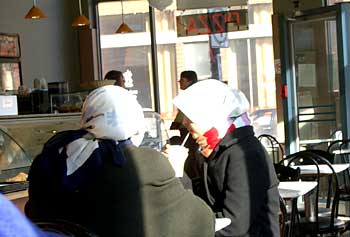
We met a friend, a graduate student at McGill, for brunch on Sunday at the mysterious cafe I wrote about for the Ecotone Cafe as Place topic a few months ago. Accompanied as I was by two men (one Asian, and one who passes for Muslim quite often, with his Middle Eastern good looks and beard) the proprietor was friendlier to me, and I kept my interaction to a "salaam" and a brief nod as we came in, and a "shukrun" as we left. J. did the ordering - cups of fine, dark, foamy coffee; croissants; fresh-baked fragrant za'atar bread, glistening green with spices and oil; a filo-wrapped spinach and onion pie, and a platter of delicious salads: lentil, couscous and tomato, and taboulleh made the authentic way, using little else but parsley and a bit of perfectly cooked bulgar.
We were sitting in the bright sunlight streaming in the window that separated us from the 10-degree-below zero day, when a van pulled up outside. Two Muslim women in headscarves got out, unloaded several cardboard boxes of prepared food and canned goods, and came into the cafe along with another man and a small child. "Ah," I thought. "A few more mysteries are about to be solved." The young woman I had already met; she was the proprietor's wife. But here was a mother - his, most likely, and the probable source of most of the wonderful food we were eating - and a beautiful child who immediately began playing a shy game of hide-and-seek with me behind the cafe chairs. After unloading the food, the mother and wife sat down and had something to drink while the two men set about making pizza.
I felt better, watching the calmness of this small family, and knowing that the loneliness I had feared for the young wife was probably not a reality. I was glad that they are in Quebec and not in France, where the appalling and short-sighted ban on headscarves would cause them so much pain. And if we hadn't had a guest I would have gone over and tried to speak to the two women, for that, I've learned, is how Muslim culture works: women forming relationships with women, sitting over food and its preparation, caring for the small children, talking. It surprised me to realize that in three or so years I've gained enough confidence to even consider trying to bridge the huge gaps between strangers separated by culture, location, religion and even language. What language could we communicate in? French perhaps; I still don't know where this family is from, but I think they are Turkish. Next time I want to tell the mother how delicious her food is, and tell her I also make this kind of taboulleh, which I learned from my own mother-in-law. We have a lot in common, really, all that we need for a conversation: we are women, and we've spent our lives making food for those we love, and for hungry strangers.

4:55 PM
|
Thursday, January 29, 2004
A DIGRESSION.
Today I opened the attic door to take some unused dishes upstairs and store them. On the bottom step I saw a small brown furry shape. A bat, I thought. Is it dead? We know there are bats in the attic, in summer, but this is the middle of winter. What to do? I shut the door, put down the dishes. Opened the door. Holding a magazine or a paper towel, some sort of paper, i can't remember, in my hand I poked very gently at the fuzzy brown ball. It moved, sleepily, shifting its legs and folded wings and curling back up again. I shut the door, and felt a wave of sympathy. It's cold, I thought. Freezing. So it has come down the stairs to huddle on the other side of this door that leads to heat. I can't very well invite it in, but I can leave it alone. J. came upstairs for dinner an hour later. We have a bat, I said, and opened the door a crack. Oh, it's gone. No there it is, crawling up the inside of the door frame. It looked at us with one tiny, beady black eye.
10:23 PM
|

Another thing I like about the Basilica Notre Dame is that many of the stained glass windows depict local, historical scenes that had a religious focus. Nearly every place in Montreal and Quebec is named after Saint Someone, or important historical and political figures - most of whom were French and Catholic to the core. Thus, in the cathedral, you get a picture of Jeanne Mance, an early settler who was a Florence Nightingale figure, now considered a sort of patron saint of the city, caring for the poor and sick; or a painting of a nun sitting with two Indian women dressed in fringed deerskin to whom she has given food.
Montreal is watched over by "Mont Royal", a smallish but predominant mountain that rises above what is now the McGill university campus. There's a huge cross up on the mountain, and despite the great ethnic and religious diversity of this city, I doubt that anyone could pass a law ordering it taken down. In the stained glass window shown here, Maisonneuve carries the first cross to the top of Mont Royal in the snow.
From Frommer's History of Quebec and Montreal:
The Founding Of Montreal--Paul de Chomedey, sieur de Maisonneuve arrived in 1642 to establish a colony and to plant a crucifix atop the hill he called Mont-Royal. He and his band of settlers came ashore and founded Ville-Marie, dedicated to the Virgin Mary, at the spot now marked by Place Royale. They built a fort, a chapel, stores, and houses, and the energetic Jeanne Mance made her indelible mark by founding the hospital named Hotel-Dieu-de-Montréal, which still exists today.
Life was not easy. Unlike the friendly Algonquins who lived in nearby regions, the Iroquois in Montréal had no intention of living in peace with the new settlers. Fierce battles raged for years, and the settlers were lucky that their numbers included such undauntable souls as la Salle, du Luth, de la Mothe Cadillac, and the brothers Lemoyne.
At Place d'Armes stands a statue of de Maisonneuve, marking the spot where the settlers defeated the Iroquois in bloody hand-to-hand fighting, with de Maisonneuve himself locked in mortal combat with the Iroquois chief. De Maisonneuve won.
From that time the settlement prospered, though in 1760 it fell to the British, the year after Wolfe defeated Montcalm on the Plains of Abraham in Québec. Until the 1800s the city was contained in the area known today as Vieux-Montréal. Its ancient walls no longer stand, but its long and colorful past is preserved in the streets, houses, and churches of the Old City.
5:37 PM
|
Wednesday, January 28, 2004
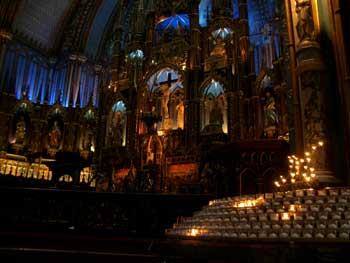
La basilique Notre Dame de Montreal
The cathedral of Notre Dame sits in an urban neighborhood of Montreal, facing north, with the river and the Old City below and at its back. When I go to church in Montreal, which is not often, I go to Christ Church Cathedral, the Anglican church in the center of downtown, on the western side of the city, beyond the north-south dividing line that historically separated the English Protestant side of the city from the French Catholic one. But I've gotten in a habit of going to Notre Dame to sit and pray, light a candle, listen to the organ, walk up and down the side aisles past the polychromed saints and the banks of lamps and candles. I like cathedrals anyway; I like abandoning my Protestant reserve for a little while and giving myself over to the ritual of lighting a candle with a long wooden straw, and listening to the sound of my coin as it drops into the brass offertory box, even though I vigorously resist the idea that I'm paying for prayers. I like to stare at the carved wooden confessionals, dark and empty during the daytime, and the wheelchair ramp leading up to a secret room into which people disappear and where, I suppose, a priest does await them. Sometimes I toy with the idea of going there myself - what would I say? "Bless me Father, for I have sinned, I'm an Episcopalian from New Hampshire and I write about Gene Robinson?" So far my curiosityhas stopped short of such an experiment.
I like Notre Dame because it is mostly quiet, except for the faint strains of organ music or a singer practicing in a far room, and the murmur of visitors. I like it because it is so unabashedly Catholic, filled with statues of saints and figures of the Blessed Virgin Mary. I like the basin of holy water at the entrance, the other-worldly blue lights behind the altar and the way that every inch of wood has been painted and decorated and gilded; it is so French, so over-the-top. And I suppose I like suspending my Protestantism and intellectualism enough to be small, and awed, and one of many.
There is something enormously powerful about ritual, whether it is the piling of stones in a cairn on a Tibetan mountain, or lighting a yak-butter lamp, or bowing before an altar. I don't pretend to understand it, and I don't often give myself to it fully, or without somehow apologizing simultaneously to my rational mind, which almost certainly defeats the purpose. But sometimes it happens, in a spontaneous gesture that springs from somewhere beyond the reach of that mind. In those rare moments I feel a connection to a deeper, ageless self, and to the millions of humans who are simpler souls, less burdened by the intellectual baggage and self-consciousness of western civilization and the legacy of the enlightenment.
8:35 PM
|
I hope everyone has checked out Natalie's brilliant, illustrated list of THOUGHTS at blaugustine.
8:21 PM
|
Tuesday, January 27, 2004
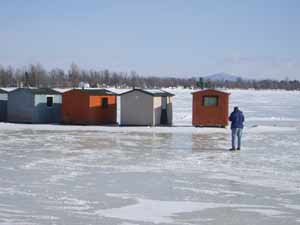
THE DANCE OF THE ICE-SHANTIES
On our way to Canada this time, we got off the highway and drove across the flat, wind-scoured floodplain of the Richelieu River. We drove past farmhouses, barns, and grain silos, set like scattered oases in a white desert that stretches to the horizon. Snow lies in the frozen furrows, punctuated only by rows of stiff, cut cornstalks, and the wind carries any loose snow and remnants of dusty soil across the fields from west to east, where they pile in huge drifts against any obstacle - usually a house, silo, or barn. It's hard to imagine living in such an inhospitable landscape, or to imagine the fertile crops of corn, wheat, and even strawberries that will grow here in half a year.
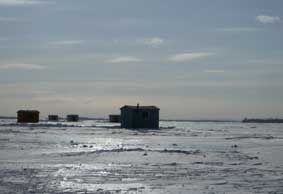
The road took us along the very top of Lake Champlain, the 120-mile-long lake that runs down from Canada and divides Vermont and upper New York State. The lake was both an historical waterway and site of many battles during the French and Indian War and the Revolution; it's also very beautiful, with the Green Mountains of Vermont visible on the eastern side, and the Adirondacks on the west. In the picture at the top of this post are ice fishing shacks for rent along the shoreline. Don't they look like they might rise up on legs (in striped stockings, maybe) and dance? In the distance is Jay Peak, one of the largest and northernmost peaks of Vermont's Green Mountains. We walked out onto the ice to look around and discovered that there was a "road" out onto the lake and trucks and cars moving out there -- so we drove out. The second photo was taken half a mile out; there were two "chemins" (roads) with whimsical signs and arrows, and ice fishing shacks, complete with chimneys puffing smoke, arrayed along them, as far as we could see into the distance. The ice itself was glassy and, mercifully, thick.

Every summer there are sightings in Champlain of a Loch Ness-like creature, well known to the locals and nicknamed "Champ". I think most northern New Englanders believe there's something in the lake; there have just been too many sightings and photos to dismiss but never anything conclusive. And besides, people want to believe in such things. The front of this restaurant at the top of the lake was drifted full of snow, but I liked its spirit.
A few miles further on, we crossed the Richelieu, which runs out of the lake to St. Lawrence. We stopped in the center of a town to take pictures of an aluminum-steepled Catholic church and its graveyard, the tombstones with their crosses and French names barely visible above the drifted snow. On the road outside that town, along the river, we passed a marina where big sailing boats were wrapped for the winter in blue shrink-wrap plastic covers, and slowed to pass a huge, bright yellow, snow-eating machine, with a frontal screw-like mechanism inside a plowblade. It cut a clean swath through the packed drifts, and sent the plowed snow up into a chute that blew the snow into a huge arc, across the highway, over the tops of passing cars and trucks.
4:44 PM
|
Monday, January 26, 2004

Book Browsing at Indigo, downtown Montreal.
Back home, in a warm house. Ahhh. I've rarely been out in weather as cold as the past few days in Montreal, but it was exhilarating. My gratitude for high-tech wind-blocking outerwear and fleece and wool has never been greater; when bundled up properly the only parts of my body that felt cold were the exposed bits of skin on my cheeks and around my eyes, and perhaps the backs of my legs where the wind whipped against them. We walked long blocks between destinations, ducking into the often-unmarked hobbit-holes that lead to the Metro and Montreal's famous "underground city" of shops and restaurants, or arriving at a movie theater, shop, restaurant or cafe to relish the rush of warm air and begin the unpeeling of parkas, fleece jackets, vests, hats, scarves and balaclavas so that we could sit and eat or watch or wander in comfort until the next brave foray out into the elements. I'll write more about the trip over the next few days; we did a lot in a short time and it was a good break before some very concentrated work that's coming up.
And here's Cassandra, peeking at you:

8:16 PM
|
Saturday, January 24, 2004
Hi. I'm writing from Montreal, where it is very cold and windy but quite sunny. This internet place is closed tomorrow so I probably won't be blogging until I get back on Monday, with new words and pictures from our adventures. I think of all of you.
1:58 PM
|
Thursday, January 22, 2004
This afternoon I went to see my father-in-law. It was just starting to snow - big fat flakes separated by what felt like two or three feet of air. I stopped at the nursery at the foot of the hill below his retirement home, thinking I'd go in the greenhouse and find some little blooming thing to take him. When I walked in, I was greeted by a three-tiered shelf of little pots filled with just-blooming "Tete-a-Tete" narcissus. "That would do just fine," I thought, and headed for the greenhouse anyway, past a big bushel basket filled with paperwhite narcissus bulbs. The greenhouse was...green. And it was moist, and warm, and packed full of plants the likes of which I hadn't seen for many months. I wandered past ficus trees and hibiscus bushes, ivies trailing from the ceiling and begonias with huge silvery leaves. I stopped and considered a bay filled with bright-colored primroses, and then lingered over the orchids - pink, pure white, spotted with gold, their flat impassive faces turned toward the light. There were cactuses in bloom, and orange and lemon trees carrying fruit, and hanging exotic ferns whose damp fronds brushed their dampness onto the shoulders of my coat.
But I decided, in the end, on the little daffodils, made my purchase and went for my visit. We sat in his warm room, far warmer than our house, with the daffodils on a folding tray by the blue velveteen loveseat, and talked about Damascus, and the best kind of za'atar bread, and he told me, again, the story of a silver ring with a scarab he once had and how it came to be lost.
When I came out, it was snowing much harder, but the flakes were still big, which usually means a squall of fairly short duration. So I drove on into town and spent a contented hour at the library, down in the theology and religion section, where my only companions were a confused Asian girl in a pink down jacket and a handsome man a bit older than myself, with fuzzy grey hair and a beard, wrapped in a handknit Aran sweater and bent over his own pile of books.
At 4:15, I checked out my books at the circulation desk and walked out to find the storm stopped and brilliant late afternoon light spilling from the west onto the campus. The white sides of the old college buildings were dazzling, the snow pinkish-gold, the brick of the library and administration buildings warmed into a gilded russet. It was as beautiful as I've ever seen the campus, but as I drove around the Green all the students were walking, heads down, backpacks filled, as usual, while nature put on her glorious light show beyond their oblivious eyes. As I got onto the highway, the drama increased. Allegorical, pink-tinged clouds filled the horizon, amid an azure sky, and the back-lit trees, each branch dusted with new snow, glowed golden against the darker evergreens. The new snow had covered everything with a fine white dust, obliterating the muddy, splattered road sand along the road's edges. Individual differences among the tall white pines, standing like a line of identical magistrates in black robes and powdered wigs, were erased by the dusting of snow. In the distance, the hills faded into shades of blue and purple, whitened by the snow and burnished by the light. It was a familiar landscape made mythic, at least for a few moments of sunset on one particular day.
5:17 PM
|
Wednesday, January 21, 2004

Martin Luther King, Jr.
From a Time, Inc. photo essay on Martin Luther King, Jr. by photographer Flip Schulke
MARTIN LUTHER KING, JR. ON NONCOMFORMITY (1963):
"This hour in history needs a dedicated circle of transformed nonconformists. Dangerous passions of pride, hatred and selfishness are enthroned in our lives; truth lies prostrate on the rugged hills of nameless Calvaries. The saving of our world from pending doom will come, not through the complacent adjustment of the conforming majority, but through the creative maladjustment of a nonconforming minority."
Nonconformity. That's not a word you hear much these days, but when I was young it was our definition: often applied derogatorily, but worn proudly. Sixties-bashers have sometimes said that calling a bunch of hippies and flower children all wearing long hair and beads "nonconformists" is ridiculous, that the youth of the sixties were just as conformist as anyone. But I think either these critics weren't there, or they've missed the point.
What Martin Luther King, Jr. is talking about in this quote with the marvelous phrase: "creative maladjustment of a nonconforming minority" was an attitude of rebellion against the status quo and the powers that attempted to control American society. It was this much more than it was an inner-turning conformity to a different norm of acceptability. For those of us who were part of that rebellion, the wide range of difference among the participants was evident and accepted. For those of us who were in it for political change, it was not a matter of doing drugs or wearing beads or a certain hairstyle, it was a shared understanding that what was going down in Vietnam, in Washington, on campuses, and in the inner cities was wrong and unacceptable. The people who agreed with the war and agreed with the government were the conformists and the enablers.
I sometimes wonder, looking around at the America of today, and especially at some of the college campuses and the students who appear to me to be idealistic but in a different way, as well as very naive, and respectful and unquestioning about authority, that conformity is once again considered a virtue. So much so, in fact, that it isn't even a word that gets used. I'd love to hear arguments to the contrary, because I'd love to believe that a new generation of non-conformists is likely to spring forth. Where I saw that nonconformity again was at the peace march last year in New York, where a crowd of all ages and all backgrounds united for one purpose, to try to take back our world from the powers that threaten it.
I guess I've always been maladjusted, when it comes to the society around me. Here's to more "creative maladjustment", and "transformed nonconformity".
2:48 PM
|
Tuesday, January 20, 2004
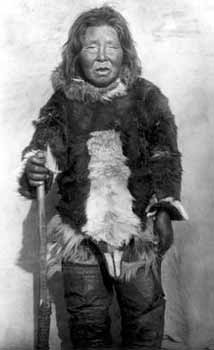
The old Inuit woman Qulé.
Thule 1909. Historical photograph from the Danish Polar Institute
WHY? WHY?
Run, don't walk, your fingers across the keys to Via Negativa and Dave's latest post, Qarrtsiluni, on Inuit philosophy and spiritual thought.
10:50 AM
|
Monday, January 19, 2004
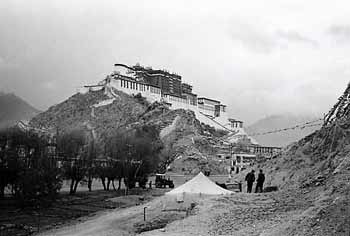
The Potala Palace in Lhasa, Tibet, from a photo essay by Shaun Boyle
A few nights ago we saw Home to Tibet, a documentary film by Alan Dater and Lisa Merton. I had seen the film, a story of a Tibetan refugee's risk-filled journey back home to try see his sister, and been very moved by it, but this time we were invited to dinner beforehand with the refugee, Sonam Lama, his family, and the filmmakers, who live not too far from here. It was great to meet Alan and Lisa, with whom J. and I found we had a lot in common, and to have a chance to meet Sonam in person.
He had been studying to become a monk when the Chinese invaded and began trying to crush native Tibetan culture and, especially, the Tibetan Buddhism which is its heart and soul. Sonam was imprisoned but escaped with two young friends during an epic forty-day journey traveling by night and living on tsampa, roasted ground barley mixed with water. He ended up in India, and eventually found his way to the United States. Ten years ago he went back to try to see his sister who had raised him after the deaths of his parents, and Alan Dater, who had met Sonam only a few weeks before, went along to attempt to make a film about the journey.
Neither Sonam nor Alan knew if they would reach Tibet or be allowed inside the country, and they certainly knew they had to film surreptitiously. Maybe his audience with the Dalai Lama, or the special chants, or all the prayer flags Sonam offered helped him reach his destination safely, but he did. He found a sister who, at 47, had aged so much that she was unrecognizeable. The film's most wrenching moments surround the decision by this sister and Sonam's cousins to send their two young daughters with him, in hopes that the girls could receive an education in India, since Tibetan children are largely prohibited from school and from learning their own language. Despite the fact that one of these girls is an only child, and her parents know they may never see her again, they send her with Sonam out of the country. We witness this extraordinary moment of selfless, heart-rending love.
The screening took place at a local Episcopal church, not mine, and is part of a film series on people whose lives embodied visions of hope; the next film will be on Dorothy Day. Afterward, Sonam answered questions and ended the presentation with a soft-spoken request for monetary help for some other Tibetan refugees, mostly still living in India. I realized, watching him, that although he works as a stonemason and has made a life for himself in this country, his lifelong purpose will be to help others like himself, and to further the cause not only of Tibetans in exile but of freedom for Tibet. I couldn't help but compare the immediacy, simplicity, and utter sincerity of his purpose with my own life -- completely sympathetic but light-years removed from the actual, personal reality of political persecution, death, and exile.
Sonam is a devout Buddhist, and he was asked, "How is it that you can have compassion for your enemies, the Chinese?" He smiled and quietly replied, "Because we believe in karma, we know that wishing harm on another being eventually comes back to harm us, so we try not to do this and not create more bad karma for ourselves. Likewise, we see that the Chinese are harming many people, and we believe that this bad karma they are creating will affect them in their future lives. Seeing what harm they are doing to themselves, we try to feel compassion for them in their ignorance of this cycle."
The questioner said, "But that is so hard! I don't think I could do that!"
"Oh, I agree," he said. "it is very difficult for me too, but that is why we practice."
4:42 PM
|
Saturday, January 17, 2004
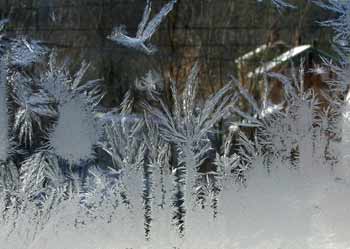
ICE ANGEL
I was a little surprised to find her on my window this morning. She's melted in the time it took me to download the file and write this post.
9:44 AM
|
Friday, January 16, 2004
Last night I went out to choir rehearsal at 7:00 pm. I bundled up in two sweaters, my down parka, a furry (don't cringe, it's fake) hat, insulated gloves, and wrapped a scarf around my face. The snow crunched underfoot as I scurried to the garage; when I started the car, even though it had been inside, it protested mightily, and hadn't fully warmed up by the time I reached my destination ten minutes later. My fingers were icy on the steering wheel, and it was hard to gather up my music and lock the car before rushing across the parking lot and the busy street to the church.
We are a hardy bunch, this choir, but a lot of people hadn't made it to rehearsal, due to illness or car trouble, or the need to stay home and take care of their woodstoves. We stood around in the choir room, blowing on our hands, shivering, and stamping feet to get the circulation going. After a hard but rewarding practice grappling mainly with the intricacies of Mozart's Laudate Pueri and a modern piece we're singing for an upcoming ordination, The Day King Uzziah Died, our director let us go half an hour early. I put on all my layers again and stepped out into the even colder air; nothing, not even a lifetime like mine spent in this godforsaken climate, prepares you for the shock of air hitting your cheeks at 10 or 20 below zero, or the way the first breath enters your nostrils and immediately freezes every available hair inside. And yet there is something glorious about it: pure, clean, crystalline and elemental. I walked quickly across the street, trying to be fully aware of all the sensations presented to my body by an environment so hostile and yet so beautiful, yet knowing I could not survive for many hours in it without shelter. Thinking hard about those who were struggling with that reality this night, I got in my car and started home.
In the King Uzziah piece, its text taken from Isaiah, there is a vision of heaven, with God on a throne, surrounded by thousands of angels, and one of the seraphim in flight, carrying a burning coal which he places on the lips of the prophet. Turning onto the back road and heading home, I looked up at the inky black sky and few stars shining overhead, and for a moment I could almost imagine flying angels carrying hot coals in outstretched tongs, through a freezing night, over the dying souls of people desperate for warmth.
4:49 PM
|
Thursday, January 15, 2004

Orion.
COMING AND GOING
For today’s ECOTONE topic, “Place: Coming and Going”, I decided to post this excerpt from a journal I wrote during a trip to London in 1998. There are fifty pages of journal in-between the sections headed “Going” and “Coming”, and, as it turned out, I didn’t make it to my planned destination of Canterbury at all. However, the project envisioned back then continues in other forms, including writing about "Place" for the Ecotone.
GOING
December 14, 1998. In the air.
Water. Below me, the world has become nothing but water, clear blue stretching to the horizon, where it is met by sky. White clouds, water in another form, ridged like mountains, float above the surface of the Atlantic. The coast of New England curves away in the distance, all details of human habitation lost in the atmospheric perspective which fades everything to a uniform pale blue.
We've never taken the morning flight to Heathrow before. It is a spacious and comfortable 777, perhaps two-thirds full. As we climb to cruising altitude, the BBC World Service news plays on the flat, individual video screen mounted on the seat in front of me. We watch President and Mrs. Clinton disembark in the Middle East to make his historic visit to Palestine; in Washington, the House is beginning its impeachment debate, with a vote expected on the floor on Thursday. Clinton looks grim; like us, he is escaping.
--
The alarm rang at 3:15 a.m. I woke to find J. turning the electronic clock in his hands like a pro-hominid discovering a transistor radio for the first time. "How do I make it stop?" he moaned, still asleep, before realizing the sound wasn't coming from the clock at all, but from the tiny travel alarm on the nightstand.
We left at 4:00, the cold air on my face removing the last traces of sleepiness. As we drove away, the only light in the village was a small pine tree at the end of our street, completely encrusted with white Christmas lights.
In the blackness, devoid of stars or moon, I found myself noticing glowing things: reflective bands on the village fire hydrants, the white dividing lines on the highway curling off in the east, and the gleaming guardrail-markers, long strings of pearls for the sleeping giantess whose dark curves define this rising, falling landscape of mountain foothills.
As we left what I think of as home territory -- the outermost towns where people known to me, from work or church, lay sleeping -- a tiny reclining crescent moon appeared through a break in the clouds. Ten miles later, the clouds had disappeared and the sky was alight with stars in winter constellations: the Big Dipper, upside down to the left of the moon; on the right, Orion's foot balanced on the horizon, his bow pointed skyward. For miles at a time, not a sign of human dwelling, just the deep, dark Hansel-and-Gretel woods on either side of the road. We watched carefully for moose. Suddenly, I saw a shooting star, and then another. While I looked out the side window, J. saw two more. In the hour between 4:00 and 5:00, we counted ten, finally spotting them simultaneously. The last one fell all the way from the zenith, blazing a hot trail across the black sky.
Tonight the stars remarked to me, matter-of-factly, "We're here all the time, you know." I realized how I never imagined them being there during my waking hours: obscured by daylight, but shining behind the sky all the same. Somehow, I imagined the stars disappearing and rising like the moon. Why is it that so often we must travel away from the familiar to discover, with a jolt, truths that have been with us all along?
Near the Massachusetts border we left the dark wild landscape for good. As always, I found myself recoiling at the bright toll-plaza lamps, the tall signs for petroleum companies, the billboards, the sprawling malls, franchise motels, fast food establishments. I tried to imagine living in these faceless communities, and could not. "Well, what are you doing?" I asked myself. "You're leaving to spend two weeks in one of the largest cities in the world." But it's not the city I despise; there, at least sometimes, building has been concentrated into one plot of earth, and, in the city-center, planned for centuries. In London, great visual beauty, vigor, and individuality co-exist with the garish and vulgar, and generally win out. But in the suburbs of southern Massachusetts and Connecticut, what I feel most is the waste -- beautiful land chopped up as if it were an inexhaustible commodity. The natural landscape is often obliterated; you literally cannot see the forest for the signs. What does this do to people? Still north of the Massachusetts border at 5:15 a.m., traffic was already greatly increased and the driving aggressive. My sense of being a special traveler through a dark night of shooting stars disappeared with the dawn; we became simply one of a thousand cars hurtling toward their destinations.
6:00 p.m., London time. The sun has just set, the gold light fading from the wings of the jet and the pink that rimmed the horizon now a deep blue. I'm waiting to see my stars again -- for the second time in eight hours.
Across the aisle, a British mother who preceded us at check-in tries to sleep. Her little son, with his perfect, round, serious face, has clutched a floppy-eared bunny ever since I spotted him, seated on a pile of luggage, near the baggage counter. His was the first British accent I heard today, his clear little voice piping up to say, "Oy cahn cahdee moy rahbeet eento de plane moyself, cahn't oy?" Another mother, in a white sweater with a fanny pack worn frontways (who invented those awful things?) just walked down the aisle with her child on a leash. The first little boy, rabbit in his arms, watches them pass with silent solemnity, but I detect shock in his eyes.
Most of the passengers are watching in-flight movies; some work on laptops; some sleep or read. I'm willing to bet, however, that I'm the only one with her nose in Chaucer.
Part of my plan this trip, if possible, is to go to Canterbury. So the other night, at home, I pulled my volume of Chaucer's tales off the shelf and read the first page of the Prologue:
And specially, from every shire's end
In England, down to Canterbury they wend
To seek the holy blissful martyr, quick
In giving help to them when they were sick.
Chaucer's pilgrimage began in Southwark, a very old section of London across the Thames from the Tower, at an inn called the Tabard. He began writing the Canterbury Tales in 1386; it was still unfinished at his death in 1400. At that time, Richard II was King. When Chaucer died, just one year short of 600 years ago, he was buried in Westminster Abbey, the first of the great writers to lie in what became known as the Poet's Corner.
Our last visit to London ended in Southwark; this year's plans are not so much a religious pilgrimage to Canterbury, but an acknowledgement of these yearly visits as a personal pilgrimage, or, perhaps more accurately, a quest whereby I am gradually piecing together bits of myself. I told J., my first-generation, Armenian/Arab husband, that whenever I approach England I feel that I am coming home. "I know you do," he said, smiling at me. It took me two trips to realize this, two more to begin to see and write the outlines of a story which began centuries ago.
My earliest immigrant ancestors sailed for America from England almost exactly one century after Chaucer's death. For five hundred years, except for my father's service in the Second World War, no one returned across the Atlantic. Yet when I step off the plane, enter the crowded train from Heathrow to London, and set foot on the city streets, I am conscious of entering a familiar gene pool and a common heritage of manner, custom, interest and sensibility, almost too subtle to describe, that has somehow been kept alive in my family through generations lived out in "New" England and "New" York. It strikes me as incredible that this should be, so much so that I feel bound, by the great privilege which has fallen to me, to search and decipher, contemplate and record.
I try to bring to this task all my accumulated experiences, but am continually conscious of beginning again at the beginning. How, for example, has it taken forty-six years of my life to read Chaucer? Last night, back home, I was laughing out loud as I read his descriptions of his fellow-pilgrims in the Prologue. Yes, there were terms I didn't know. What was a Pardoner, a Summoner, a Reeve? But the footnotes explained what was unfamiliar. Far more astonishing is Chaucer's voice, which rolls effortlessly out of the fourteenth century to meet my twentieth-century ears with humor and immediacy. I am cheating by reading the Penguin edition, a modern translation of the original Middle English, but it's probably the only way I would read the work; so far, on the plane, I’ve devoured eighty pages and am captivated.
COMING
1:30 am. In the air.
Somewhere below is the coast of Greenland and the city of Godthab, near its tip. I'm listening to Haydn's Harmony Mass on the in-flight radio and sipping a paper cupful of extremely strong tea I procured from the flight attendant in the rear galley. "If you don't like this I'll make you a new pot," he said, and it is pretty strong stuff. J. is trying to sleep and that's good, he has 2 1/2 hours of driving after we land in Boston.
Mrs. Marazzi interrupted her late lunch this afternoon at the hotel to say goodbye to us. We kissed on both cheeks; I complimented her on the staff, and told her my only wish was that the sitting room had a piano, that I couldn't wait to get back home to mine. "We used to have one, a big one," she said, "but we had to get rid of it because the guests complained." I'm sure they did -- a piano would carry loudly through the hotel’s pressed-tin ceilings and thin walls. Unlike last year, when I couldn't bear the thought of going home, today I felt a little sad but basically contented. We know, now, that we'll be back. But more important, London comes with us; I've figured out how to assimilate what happens to me here and allow it to remain in me back home.
I'm gradually learning how to live the hours of my everyday life as a journey, even though, from the outside, the days and their pattern may appear routine. Each time I sit down at the piano or in front of a blank sheet of paper, I walk into that world-between-worlds, the tunnel that leads from the departure terminal into the aircraft with the ability to fly wherever it wants. It has taken a long time for me to see this. Living in this way, each day becomes an adventure within the self, accompanied by the sum of all of one's previous experiences and whatever guides we ask along: Chaucer or Calvino, Bach or Bob Dylan.
But this journey also exists alongside the paradoxical, parallel realization that no journey is necessary -- that we have already arrived at the only destination worth approaching, that all one needs is contained in each particular moment -- moments that, ironically, often appear to us when we are traveling.
4:38 PM
|
Wednesday, January 14, 2004
TO MOURN OR REJOICE
On his blog, Never Neutral, Ernesto Priego wrote a response to Nick Piombino’s post on “Blogging and Narcissism”, which said, in part:
I also wrote my post thinking that my writing (or this blog's writing) should bear (or does indeed bear) the work of mourning of not being written for someone in particular... If blogging could be considered as the work of mourning of writing, the blogger, the writing blogger, as Sontag's artist, would be an "ideal sufferer", a mourner…
While it is true that blogging -- still a lonely activity, as writing itself -- has made possible a contact with other writers and readers that before internet technology was unthinkable, blogs remain quite isolated from the rest of the world…
We are always mourning one absence or another. Writing, as a technology "under the sign of mourning," is a way of working-through and as such a way of becoming…
I respect Ernesto's take on writing and think it may express the feelings of many writers. For me it's very different. I write because it makes me happier than if I don’t write. I write because I can’t help it. I write because it’s creative, and interesting, and makes my mind work, and a busy, engaged mind makes me feel more alive. I write because writing makes me think about both the particular and the universal; it requires me both to know myself, and to consider “otherness”; rather than isolating me, it makes me feel more connected not just to people but to everything that is out there for my mind to observe, mull, and translate – haltingly or delightedly - into words.
I don’t write for any “ideal” reader; I don’t know who that could be. So there is no sense of absence; I am here, I write first of all for myself. A quite successful filmmaker and author once told me, “Whatever you create, you had better do it for yourself and not for the world, because nearly all the time you will never get the “reward” you may be subconsciously seeking.” I was a lot younger then, and his advice struck me as stark indeed. It has also proved to be both true and helpful, and I often recall it when my ego-needs have crawled up to sit, staring demandingly at me, from the top of my work.
That doesn’t mean I don’t desire and love feedback, and even more, that irreplaceable sense of touching someone else’s spirit. I blog because blogging makes me happier than other forms of writing do, mainly because there is more opportunity to know that has happened. But that doesn’t mean other forms with less interaction aren’t valid or important, or worthy of my best effort.
Recently I had an article published in a well-respected religious journal. It was, for me, a milestone of sorts. My e-mail address was published with the article. I got precisely three responses from people who weren’t my friends (and hadn’t, therefore, received the notice I sent out), and one of those was a furious rant against the “blasphemous” opinion I had expressed. Almost any day, through Cassandra, I get more (and far nicer) responses (and thanks and affirmation) than that. But you just don’t know; you don’t know, as the Buddhist saying goes, “when one word of yours will become a ferryboat for someone.” I’ve heard occasionally, out of the blue or by coincidence, from a stranger who was deeply affected by something I wrote. Art is like that; acting autonomously, anonymously, its effect is often personal and unknown, seeping into the groundwater of the already flowing life of reader, listener, viewer, only to emerge much later in a spring somewhere far from the source. That we may play such an unknowing role in someone else’s life is part of the miraculous power and generosity of creativity. I think, as writers, we need to trust this and assent to it, to follow our gift as best we can, and allow ourselves to communicate not only with the known reader who affirms us but the unknown reader who never will. I find nothing to mourn in that.
5:17 PM
|
Monday, January 12, 2004
REQUIRED READING For WRITERS
Blogging and Narcissism, by the brilliantly perceptive Nick Piombino at fait accompli (and no, you aren't an automatic narcissist just because you blog).
Meditations on Life & Writing, a newly-discovered blog for me. Angel V. Shannon's writing about writing, specifically about finding her voice and the will to persevere, is inspiring, unaffected, and true; see especially the entry for Dec. 6th, "Giving It Up".
AND A REMINDER:
The topic for January 15 (this Thursday) at the Ecotone Wiki is "Place: Coming and Going". Why not write and post a response? And no, the entry below is not for that topic, although I guess it could be.
5:25 PM
|
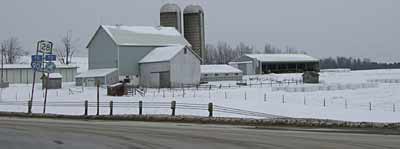
Dairy farm near Richfield Springs, NY
If you click here or on photoblog in the black box, you'll be able to travel with me in pictures out the eastern side of the New York State Thruway and up toward New England.
Human pathways often follow on top of one another; Rt. 20, the old east-west road across New York State, followed one branch of the Cherry Valley Turnpike that the early settlers used to travel west from Albany. It was superceded by the Thruway, slightly to the north, which follows Mohawk River valley and the Erie Canal. The towns along both of these roads are, for the most part, relics of bygone days when travelers came through and industries, now defunct, were healthy. Old factories stand empty; the weather blows through the mortar cracks in the old brick houses and snow bends the backs of barns, claiming a few more each winter. The old tourist attractions, like Howe Caverns, Petrified Creatures, and the Herkimer "diamond" mines stay open but attract few visitors, and motels and local eateries, long since closed, weather into strangely retro reminders of the forties and fifties: "Kathy's Home Cooking", "The Drake" with its home-made lifesize cut-out duck in front, the famous "Teepee" on Rt. 20, or the more generic signs reading simply, "Hamburgers" or "Ice Cream", on the outskirts of town after town.
The first time I remember these roads, I was a little girl and we were going to Maine; I begged to stop at the Teepee and I think we did. Now, so many years - nearly fifty of them - later, it's a relief to pull into one of the rare towns that had enough money, natural beauty, foresight and attraction to remain a thriving destination - Cooperstown, say, or Saratoga Springs. The allure of economic health and cultural diversity remind my of my own life choices, as does the decay elsewhere: except for the people, who remain friendly, warm, chatty and generous through good times and bad, much of what I remember as wonderful feels abandoned, boarded up, or greatly changed. People have forsaken the downtowns for malls, the local country inns for franchises in the small strips outside bigger towns. Mansard-roofed and brick- or clapboard-fronted downtown blocks have been lost to fire and neglect, but rarely restored or replaced except by cheap imitations cloaked in T-111 and adorned with neon and plastic, leaching the downtowns of vibrancy and integrity.
The land, however, endures. Like a woman with good bones, age and change haven't make this rolling land less beautiful. A few more houses and double-wides here and there balance the old flat-roofed Italianates fallen into ruin: but beyond them continue the shapes of the hills, the calmness of the valleys, the openness of the pastures where you can climb through the corn stubble along a hedgerow and watch steaming manure being spread on a snow-covered field below, or see the breath of the cows crowded around the hay bales in a barnyard. The land softens the unfeeling crush of time.
2:56 PM
|
Sunday, January 11, 2004
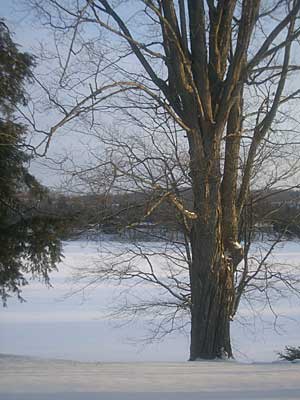
This was the view that greeted me when I came upstairs this morning at my parents' house. That venerable maple tree stands guard over the point, jutting out into the lake, where my father built their house. The tree is a home for innumerable birds, squirrels, insects - I even found a tree frog on it once - and in the autumn casts a glowing light over the water and into the house before shedding its leaves like golden foil onto the waiting earth. Back in the fifties and sixties, heading down the bank toward the ice on an aluminum flying saucer with a closeline-rope handle, I collided with that solid trunk more than once.
We had a long ride back home, with a stop for a Thai lunch in Saratoga, New York, but didn't hit snow flurries until we were in a high pass over the Green Mountains. To our great relief our house was warm and the hot water heat still running through the pipes. Some of our friends and neighbors weren't so lucky.
In the next few days I'll post some pictures of the trip across rural New York State.
7:22 PM
|
Saturday, January 10, 2004
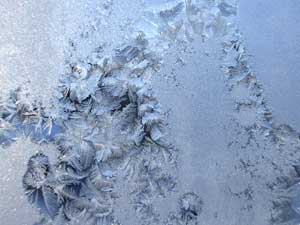
26 BELOW
Back at home, it was 26 degrees below zero last night. We’re far away, so all we can do is worry about the pipes. Even when we’re home, leaving fans and heaters running and getting up in the night to check, a dip that low can cause the heating pipes to freeze; it happens pretty quickly. If you find the spot fast enough, you can use a hair dryer to warm up the pipes and start the water flowing again. If not – it’s plumbers with electrodes, and the potential for broken pipes and expensive repairs. All you in warmer climes can be happy you don’t have to deal with these aspects of winter!
But from this cozy spot inside my parents’ house, the day outside couldn’t be more beautiful (here, considerably south of my home, it’s only 15 below at 9:30 am). The sun is brilliant on the white surface of the frozen lake, and closer by, the snow covering the lawn sparkles as if with diamond dust. Nuthatches and chickadees fly eager forays to and from the feeder, and on the huge maple beyond the porch, a red-bellied woodpecker scrambles up and down the tree, searching for what must be frozen bugs or grubs beneath the bark.
If it warms up a little, I’ll put on all the clothes I brought and try to take a few pictures. In the meantime, here are a few from yesterday.
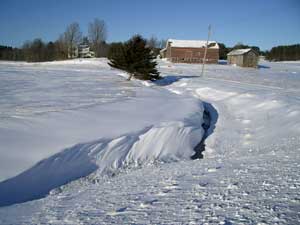
Near Herkimer, NY
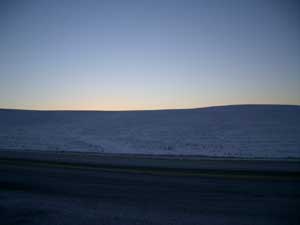
Sunset on a cornfield, Paris Hill
3:32 PM
|
Thursday, January 08, 2004
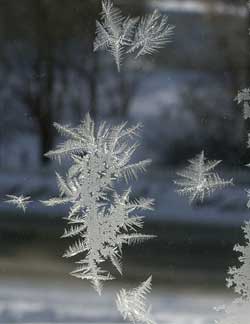
ICE FEATHERS
It's very cold here; minus 4.7 degrees F when I last looked. We just ate a homemade pizza, courtesy of J., and now I'm going to do some laundry and pack in preparation for our trip tomorrow to central New York to see my parents. In the background of my consciousness, the dishwasher is running, and also the furnace.
The discussion of consumerism in the comments has taken on a life of its own, and I think I will leave it there for the time being. Several readers have talked about this topic further on their own blogs; you might check out what Dave and Lorianne had to say in the past couple of days. And for a more data-oriented look at consumerism in Europe and the U.S., read "Richer, Stouter, and No Happier" in the science section of today's BBC World News:
The US has more private vehicles on the road than people licensed to drive them. New houses in the US were 38% bigger in 2000 than in 1975, although average household size had fallen.
Yet only about a third of Americans described themselves as "very happy", the same share as in 1957 when US citizens were just half as wealthy.
Odds and Ends:
This week I finished both The Winter Queen by Boris Akunin, and The Cave of Jose Saramago; more about those next week. I'm anxious to write something about the Saramago, it was a terrific book. And I also got a blogger-package: a bottle of homemade walnut ink from Pica of Feathers of Hope. Drawings or calligraphy to come, I hope, from all who received these precious bottles from Pica!
We'll be away through the weekend, but will probably post some pics at least from there. We're going to go to a country antiques auction - God forbid that I should get the urge to buy something!!
7:23 PM
|
Wednesday, January 07, 2004
EPIPHANY
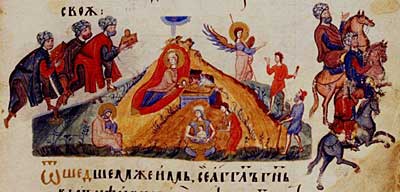
Nativity, with the Magi arriving and departing, from The Gospels of Tsar Ivan Alexander (1355-56, with additions made between 1400 and 1499); British Library Catalogue of Illuminated Manuscripts
I decided to take a break from our current discussion to observe that today is Epiphany, the 12th day of Christmas, and the day on which the Eastern Orthodox still celebrate that feast. At dinner tonight we lit a big array of candles; tomorrow the decorations will come down.
The word epiphany comes from the Greek epiphaneia, which means appearance, or manifestation, and it in turn comes from epiphainein: coming to light or appearing. The feast of Epiphany was introduced in the West much later than Christmas, probably in the fourth century. It seems, actually, that all of the events surrounding Jesus’s birth may have originally been celebrated on January 6th, and then separated into two celebrations: the nativity on Dec. 25th, and the visitation of the Magi twelve days later.
According to the New Advent Catholic Encyclopedia, a good source for esoteric historical Christian information, an “unknown Syrian annotator of Barsalibi” wrote:
"The Lord was born in the month of January on the same day on which we celebrate the Epiphany; for of old the feasts of the Nativity and Epiphany were kept on one and the same day, because on the same day He was born and baptized. The reason why our fathers changed the solemnity celebrated on 6 January, and transferred it to 25 December follows: it was the custom of the heathens to celebrate the birthday of the sun on this very day, 25 December, and on it they lit lights on account of the feast. In these solemnities and festivities the Christians too participated. When, therefore, the teachers observed that the Christians were inclined to this festival, they took counsel and decided that the true birth-feast be kept on this day, and on 6 Jan., the feast of the Epiphanies. Simultaneously, therefore, with this appointment the custom prevailed of burning lights until the sixth day."
8:38 PM
|
Tuesday, January 06, 2004
Today, in the context of our mall discussion, Joerg makes the point that not only should our non-hatred and compassion extend to everyone there, regardless of whether they push our aesthetic, political, or social buttons, but also to the people who are pushing the goods, running the offshore sweatshops, cramming plastic into the landfills, and raking in the profits. This is a far greater challenge for most of us, I suspect, than loving Jane or Joe Consumer. And yet it's real - whether it's a case of "God forgive them, for they know not what they do", or "they know damn well what they're doing, and I'm still called to try to dredge up some compassion for them as fellow human beings." (We've grappled with that tough point before in discussions on this blog - see also the posts and comments around Oct. 17 2003.)
But beyond the call to love one another, don't we have a responsibility to act in the interest of the world, or of our fellow humans, rather than simply trying to "not judge"? Lorianne mentions a famous passage from Merton where he confronted his own judgmentalism and the dualism of sacred and secular, and realized that one purpose of his solitude was to recognize his call to "love the world". What happened after that was that he wrote "Conjectures of a Guilty Bystander", in which he talked about the interplay between action and contemplation so central to his personal struggle as a cloistered monk living in a world supposedly separate from the secular, but still deeply affected by WWII and the Holocaust, the civil rights struggle, and the nuclear arms race. Merton never managed to remain silent; he spoke out, not only against what he felt was wrong in the world but against the silence and complicity of the Church hierarchy, and helped to inspire and give voice to a new generation of activists, including religious activists committed to reform of the institutions as well as peace and social justice. I'm profoundly grateful for his example.
1:41 PM
|
Monday, January 05, 2004
You know, I've really missed those of you who've been away. Finding new posts on a lot of blogs today made me really happy.

So many excellent comments on yesterday's post - thank you! Joerg said he thought the mall was a good place to practice "infinite respect" and he is right. That's what I was trying to do, even if my sharp observations about surface appearance obscured that.
It is a complex and demanding practice to consciously attempt to love everyone. And yet I think we are called to do this. Why? Because we are all very much the same. We all have more in common than in opposition, even though it is often hard to see and feel unless we quiet down and really look, really feel the other beyond their surface.
We are all animated with the same spark, our lives are profoundly interconnected, we share a common origen, common dreams and dreads, a common end. Lorianne commented that the girls in their outfits, and the young couple, and the young women in prison are probably all similar. I'd go farther, and add myself in as well. We all, as Lorianne says, want to be noticed; we want, ultimately, to be loved. Isn't that part of my purpose in writing here? In a different incarnation, Cassandra's carefully considered words and visual aesthetic might well be tartan miniskirt and fishnet stockings.
Sitting in the food court, I watched and pondered the grandmothers holding babies, the fathers in their baseball hats and work clothes, an animated little girl eating her ice cream cone with great delight and dramatic swoops of an arm designed to keep her entire family in rapt attention. I am an individual, I am special, please love me.
At the same time, I thought about the volume of plastic, paper, and styrofoam this one locus of eating must produce in the space of a single day. I thought about the cheap plastic toys, the shoddily-made sweaters, the unnecessary knicknacks that were being offered and bought. I thought about the cycle of desire, momentary satisfaction, use, boredom, discarding, and renewed desire that is so successfully taught by advertising and consumerism, and its incredible power over human beings. The toll it takes. The happiness it seldom creates. The burden on our planet. The ever-growing divide between rich and poor. And I thought about the difference between people who see this, and those who don't, and that line in Isaiah about "setting the captives free".
I have no answers, but I know eventually this enslavement has to end. I sound judgmental of the consumers, perhaps, but that isn't what I meant. What I feel is compassion for people who are caught up in something they don't understand and cannot transcend, and righteous anger against the rampant greed of those who want to keep them ignorant, while addicting more and more. Every one of us who is free enough to step outside the bonds of this system has an obligation, I think, to do so.
9:23 PM
|
Sunday, January 04, 2004
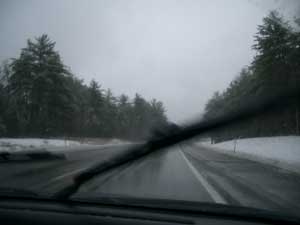
Yesterday we drove through freezing rain to Concord, New Hampshire, to hear Episcopal Bishop Gene Robinson talk about "Re-imagining the Diocese". During the morning gathering at a conference center, Gene gave a re-cap of his episcopate so far, telling stories of meeting supporters and detractors alike. One of his favorite ministries is at the New Hampshire Women's Prison, where he has quite a group of dedicated fans. He baptised one woman there on Christmas Eve, and talked of an eighteen-year-old inmate, who told him that his election meant so much to her because it gave her hope, for the first time in her life, that there might be a community of people somewhere "who could love her in spite of what she had done."
Gene than handed out the passages in Isaiah about "giving hope to the poor, binding up the brokenhearted, and setting the captive free" and the passage form the Gospel of Luke where Jesus reads these texts in the synagogue at an early point in his ministry. For that he was nearly run off a cliff, because he used them to preach that God's grace and healing power were not exclusively available to members of the "in" group, the Pharisees, but were given to complete outsiders to the "chosen" community. Gene asked us to break into groups, first with members of our own parishes, and then with random people who we didn't know, to discuss what our parishes, our diocese, our state and our world might look like if we really took these texts seriously. "The world is going to be watching how we do here in New Hampshire," he said. "And I want to challenge us to do our very best with the opportunity we've been given, to show that we can work together and accomplish much, despite our differences."
At the end of the morning, he returned to the podium to talk about two concepts that he hoped would guide our work and thinking: "Infinite Respect" toward one another and ourselves, and "Radical Hospitality" toward others. he asked us, in particular, to think about how the church might continue and expand its role as a moral voice, speaking out in the state against state-funded lotteries and gambling, for better mental health facilities and prisons, and for equality in education funding - a big issue in New Hampshire.
Gene, small and unimposing in his new purple shirt, has a speaking style that is warm, engaging, humble, and extremely compelling. He can be quite folksy, favoring the personal anecdote over the poetic quotations and highly stylized rhetoric of some of the more Ivy-League-type bishops in our denomination - a recent (and excellent) sermon by the outgoing Bishop, for example, made extensive use of T.S. Eliot's poetry - and this honest, personal, non-aggressive approach probably accounts for his popularity with wide cross-sections of the population, and the difficulty people have hating him once they've heard him speak or met him in person. That doesn't mean he doesn't have an agenda: he wants to use whatever bubble of celebrity he has been given to draw attention to the issues that have always motivated him: food for the hungry, justice for the oppressed, fairness for those who are subject to discrimination, and a redrawing of the boundaries of the church to welcome and include everyone. It's ambitious, and inspiring.
In the afternoon we stopped at a local mall to get something fast to eat and do a few errands. I don't go to big malls often, so when I do my receptors are always quivering, usually with shock and sensory overload. This was a rather downscale mall, too, so it was exceedingly noisy and crowded, particularly in the food court where we ate a fast Chinese lunch. It seemed that entire families had come to the mall to spend their Saturday, and groups of teenagers had obviously dressed especially for the occasion. Two girls, in particular caught my eye; they were both on the heavy side, but dressed in tight miniskirts with black fishnet stockings, garters that showed below the skirts, lace-up leather boots, and tight black jackets. What on earth were they doing, besides chowing down handfuls of French fries and talking animatedly with their friends? They looked...ridiculous, a caricature of both fourteen-year-old-self consciousness, and whatever punk or goth creatures they thought they were emulating. Next to me was a young couple, fresh out of high school, he apparently a gas station attendant in his Shell shirt and jacket, and she with a cheerful, ruddy farm-girl complexion, feeding their toddler, in his stroller, fried-somethings dipped in some sort of melted, fluorescent cheese food. The husband was tired, she was being sweet to him; all I could think was how young they were and how hard a time they were probably going to have. I peeked into the stroller, hoping they hadn't bought much. No, only a few plastic toys. The girl looked at me as she stood up and moved the stroller, and the baby screamed. "Nap time," she said, smiling. "He gets real tired."
"He'll recover," I said, and smiled back. "Good luck with your life," I wanted to say. "Don't max out your credit cards. Don't buy lottery tickets. Don't settle for a life of beer and chips in front of the TV", but instead I just watched as the little family disappeared into the crowd.
I walked up to the far end of the central aisle of the mall and back while J. bought a pair of shoes, and drank a cup of coffee. There was nothing I was tempted to buy, even though there were some better stores mingled among those with cheap, poorly-made clothing and the kiosks and carts selling cellphone service, trinkets, stuffed animals, sunglasses and knock-off watches. Meanwhile, the Victoria's Secret girls, already selling Valentine's Day, lounged provocatively in the larger-than-lifesize window posters. "How old is a girl like that?" I wondered, studying one brunette with her perfect body and black lace thong. "Does she actually know anything about sex? Does she like it? What are these young girls walking up and down the mall thinking when they see her? What does it mean to them to "look sexy?" Do they like sex? Or are they trying to get a husband who they hope will support their mall habit so they can keep buying the things they think they want to wear and use because somebody they saw in an ad or a movie or on TV wears them and uses them too?"
It's not good to go shopping in this kind of a mood.
J. met me in front of the cell phone accessory kiosk when he had said he would. "Are you done?" he asked.
"Yep." I said. We pushed open the big glass doors and walked out into the parking lot. I looked back at the glass pyramid-shaped towers that crowned each corner of the mall. "A slightly different temple than this morning's, wouldn't you say?"
He nodded. "I'd say so."
"I think the God of this one is winning."
5:24 PM
|
Friday, January 02, 2004
THANKS
As I wrote in one of the comment threads, thank you to everyone who sent New Year's greetings by comment or e-mail, and especially for all the unexpected kind and generous words. They're all greatly appreciated. How wonderful it is to know I'm starting this year with many, many more friends and companions than a year ago, and how grateful I am for your encouragement to keep thinking and writing here. Cassandra is one lucky girl.
5:05 PM
|
HOGMANAY
M.'s greeting from Scotland in the comment thread forced me to do a search on the word Hogmanay, which I confess I've never heard before. Here's what I found at an edinburgh site
Hogmanay is the Scottish New Year, celebrated on 31st December every year. Never being slow to spot a good excuse for a party, the night involves a celebratory drink or two, fireworks and the kissing of complete strangers – not necessarily in that order.
Where did the word Hogmanay come from?
Nobody knows for sure. Various suggestions have been made over the years and they all sound pretty good from where we are sitting:
-from the Gaelic oge maidne ("new morning")
-A Flemish combo of hoog ("high" or "great"), min ("love" or "affection") and dag ("day")
-Anglo-Saxon Haleg Monath ("Holy Month")
-Norman French word hoguinané("gift at New Year")
Maybe we can encourage language hat to weigh in on this one, since he also sent "Hogmanay" greetings, but not from the same place!
4:43 PM
|
Thursday, January 01, 2004
2004!
This morning I woke in a mood so good it surprised even me! Why? I wondered. 2003 has not been a particularly terrific one for me personally; in fact it brought some significant challenges that have by no means abated. The world situation is far worse than it was a year ago, on just about every level, and I feel even more helpless than I did then. There's no reason to view 2004 as a potential new start on either of those fronts, so this morning's cheer was no false and foolish optimism, yet it has persisted all day: through my readings of the news, lunch among the wheelchairs at my father-in-law's retirement home, political discussions about the Middle East, and remembering my mother-in-law's death exactly a year ago yesterday.
What's going on, I think, is a manifestation of my intention to try to control my own attitude in spite of everything that is uncontrollable. At times this is, of course, impossible. But I am trying to remember, and bring into conscious action, the fact that our attitude is actually the one thing over which we do have control. Victor Frankl wrote movingly about discovering this during his years in German concentration camps, and since reading him I have asked myself, "What would I do? How would I cope, if I were imprisoned, without hope?" When it finally dawned on me that this is what life IS, that we are all imprisoned within it, and forced to make our peace with the fact or not, I began to try harder to understand what that might mean.
Since 9/11, the vortex of violence and abuse of power in our world has made this "prison" all the more apparent. Where can we find refuge? In nature, which we are well on the way to destroying? In organized religion, with all its corruption, competition, and hypocrisy? In other humans, separated as we are by continents, on the one hand, and selfish individualism on the other? In consumerism? Technology? In existentialism or nihilism?
There is so much that I would like to change, ideally. But as I've thought about other people in other parts of the world, not only am I overwhelmed with gratitude for the circumstances of my own life, but I've realized that the despair, fear, and claustrophobia about life in general that we in the west, and America in particular, now feel have been experienced by others for millenia. Nothing has changed about the human condition when confronted with massive, abusive power, except our capacity to wreak havoc on a larger and larger scale and our instantaneous awareness of disaster and suffering. It's just been brought home to us, like a totally unexpected terminal diagnosis from which we recoil both collectively and personally in typical stages of anger, denial and bargaining.
So we can remain stuck there, despairing and hopeless, or we can live into a different reality. People have always found meaning in circumstances they would never have voluntarily chosen, and there are many equally valid paths they have taken, from risking their lives by openly opposing the corrupt powers and principalities, to living simply according to an entirely different set of values than the prevailing culture, achieving an inner equanimity and peace than cannot be destroyed and that radiates out to others.
Lately I've been remembering two different "teachings" that I was given. One came long ago from a healer, an alternative medicine practitioner, who told me that the distress I was feeling was more from "fighting" the situation in which I found myself than from the situation itself. "Acceptance" does not need to mean "giving in". It means learning to discern what we can do from what we cannot do, and using that discernment as the basis for conscious choice of action and attitude, rather than feeling helpless, overwhelmed, and stuck in "why me? why now?" Even in the most extreme situations, we can either be bitter, fearful, despairing, and self-focussed, or we can be loving, courageous, and interested in others, regardless of the fears and sadnesses in our hearts. Looking around the nursing home today I could see this playing out: elderly people whose buoyancy and attractiveness to others, or lack thereof, had little to do with the extent of their infirmities, or good or bad fortune, and much to do with their attitude toward life.
The second teaching came from a priest who has spent much of his life working in terribly difficult situations during the civil rights struggle here, and in the political turmoil of Central America. I had expressed a sense of feelng of being overwhelmed by the enormity of the world's problems, and wondering how to choose where to put my energy. He nodded and agreed, saying for years he had felt torn, wondering if perhaps he shouldn't have left Central America. He also admitted that he had always felt drawn toward environmental issues, and yet much of his ministry instead had had to do with race and civil rights. "I've decided, finally," he said, "that it doesn't really matter where you 'go in'. Just choose something, and do it to the best of your ability. That's all. That's all any of us are asked to do."
It moves me, the way we try to honestly share our struggles with these issues in our writing and communication here with one another; I'm grateful for the tolerance extended on both good days and bad ones. Lots of times the hardest part of the day for me is when I first wake up; maybe that's why I was so grateful to start this year relatively effortlessly and happily today. Recently I read the following exchange in Shunryu Suzuki's "Branching Streams Flow in the Darkness". Close to the bone:
Student: When I am fully awake I have, maybe, a little control over my desires, but in the morning...
Suzuki Roshi: In the mornign you have trouble. I know that. So that is why I say, "Get up!" [knocks on the table]
Student: How do you do that?
Suzuki Roshi: Just do it! Or else someone will come and hit you! [gives a kind of humorous growl]
Student: I did just get up a couple of times - I jumped out of bed. But it was such a big thing!
Suzuki Roshi: Yes. A big thing. So if you can get up pretty well, I think your practice is almost okay. That is a very good chance to practice our way. Just get up. Okay? That is the most important thing.
5:00 PM
|
|
|